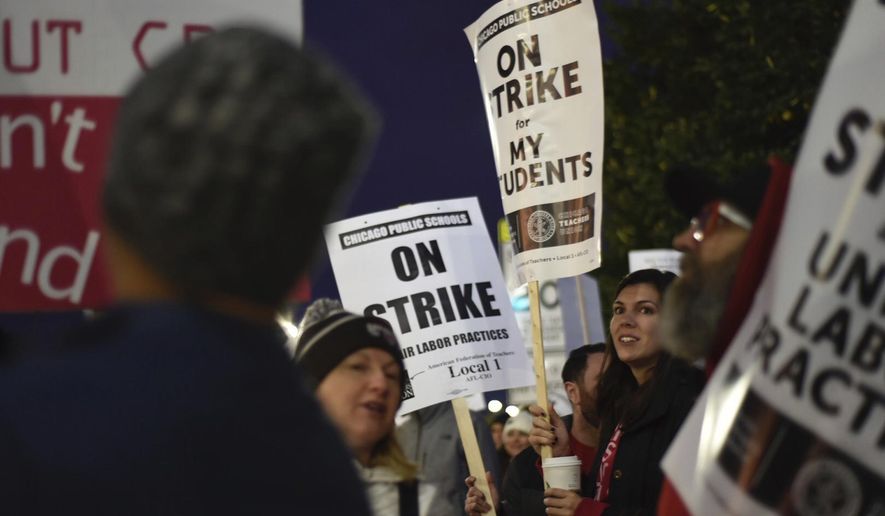OPINION:
Teachers in Chicago, where the median pay for educators, according to U.S. Census Bureau figures, comes in around $75,000, have called for a strike for more money, lower health care costs, smaller class sizes and to bring about the hiring of thousands of support staffers and the construction of 55 new schools — and are calling it a strike for “justice,” to boot. All while leaving 300,000 district school children in limbo.
This is not about “justice.” This is not about the students. This is about teachers, guided by the promptings of union heads, getting more for themselves.
It’s the second time in seven years Chicago Public Schools teachers have gone on strike.
“We have not achieved what we need to bring justice and high quality schools to the children and teachers of Chicago,” said Jesse Sharkey, the president of the Chicago Teachers Union, in a statement on National Public Radio. “We need pay and benefits that will give us dignity and respect. We are on strike until we can do better.”
Thing is, a study from the nonprofit Illinois Policy found that what these teachers want would translate into an additional $235 tax burden — or more — on each and every property owner in the city. That’s a good chunk of cash. Particularly when “nearly 60% of college-educated Chicago workers earn less than the median Chicago teacher salary of $75,000,” Illinois Policy wrote, citing Census Bureau data.
Particularly when the counter-offer from the city only raises tax burdens on property owners by an average of $13.
“Also,” Illinois Policy reported, “since the recovery from the Great Recession began in 2009, the median Chicago teacher salary has grown 75% faster than the median salary for all Chicago workers.”
Teachers in Chicago, according to the stats, are already overpaid. They’re already stretching the budgets of the taxpayers who hire them. They’re already making more than the hard-working private sector employees who pay school salaries can afford.
For teachers to discount facts and figures and instead fly their fancies for more, more, more on the wings of uncompromising unions simply showcases their selfishness. Put it this way: There are massive problems in Chicago’s public schools. These problems have been known and discussed for years. And heads up, teachers — but they don’t have so much to do with salaries as they do with the city’s problems with broken homes.
“Bored, Broke and Armed: Clues to Chicago’s Gang Violence,” The New York Times wrote in December, 2016.
“Nearly 33,000 [city] juveniles arrested over last two decades,” the Chicago Tribune wrote in July, 2018.
“Chicago’s children caught in the crossfire: Alarming number of minors shot or killed in violence-plagued city,” Fox News wrote in August, 2018.
And this, from The Great Cities Institute, a white paper on Chicago’s gang violence that was published in January, 2019: “Chicago’s high levels of violence are persisting, suggesting that current approaches need to be readjusted. … The homicide rate [in Chicago] is strongly correlated with race and concentrated poverty, with 75% of all homicides in Chicago taking place between African Americans, despite the fact that the city’s population comprises a relatively equal number of Blacks, Latinos, and whites. Long-term approaches to Chicago’s persistent homicide problem must address the city’s deep-seated issues of racism, disinvestment and concentrated poverty, as well as the more recent issue of the changing nature of gangs.”
Liberals would make the case that poverty comes from racism, bringing with it the frustration and anger that leads to membership in gangs — and that the Second Amendment is to blame for gun-related and gang-related violence.
But the larger truth is that Big Government, such as the Democratic Party craves — such as the Democrat-controlled city of Chicago advances — kills the free market; kills individual ingenuity, creativity and desire to accomplish; and, combined with a turn from God and traditional biblical principles, leads to moral, cultural and political degradation, including the disintegration of the family unit. And all that opens the door to violence, growth of gangs — and, along the way, children who are undisciplined, uncontrolled and unconcerned with formal education.
Into this mess come Chicago’s teachers.
And their big contribution to the city’s dropout rate of 20% or so — which reflects an improvement of 50% from 2004 — is to demand more pay?
That’s a me, not thee attitude. That’s a demand that’s all about the teachers; zero about the students.
Chicago’s public schools problems are many and varied. But throwing more money teachers’ way and giving higher salaries just for the sake of cooling striking heads, will do nothing to fix the schools. It will simply pacify teachers — and likely, only for a short while. After all, if striking this time brings in a substantial bump in pay, just think of the money that could be made striking next year.
• Cheryl Chumley can be reached at cchumley@washingtontimes.com or on Twitter, @ckchumley.




Please read our comment policy before commenting.